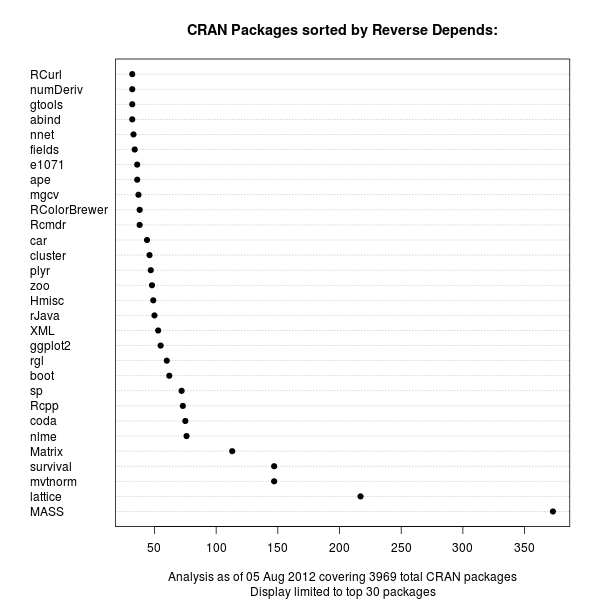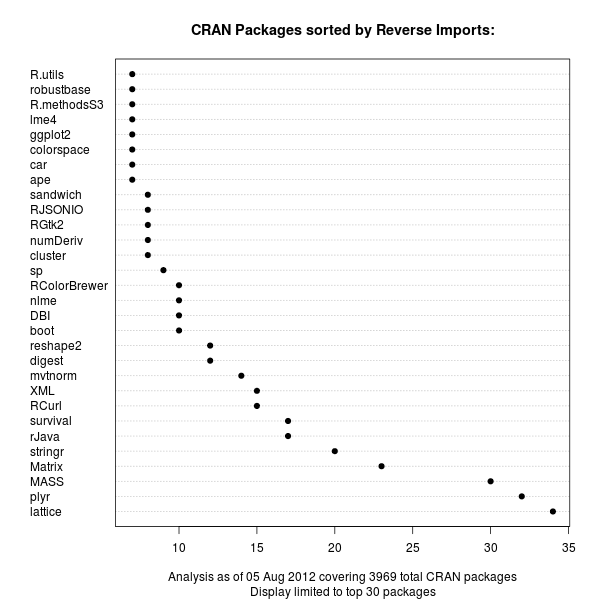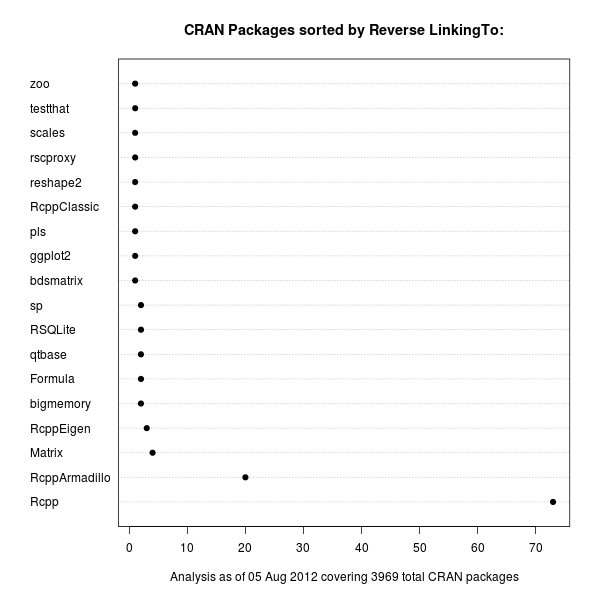
People are using computers, everywhere, really! ;)
As you might guess correctly, so do I.Basically, I am using three computers: my laptop (ThinkPad X201s, awesome machine, but pabs told me not to post any more adverts for ThinkPads on
Planet Debian *g*), my smartphone (Motorola Milestone, yes, that counts as a computer) and random_pc (for random as in my girlfriends or some other trusted (!!!) friends computer).
My laptop is running Debian GNU/Linux unstable with Xfce4.6, my smartphone is running Android 2.2.1 Froyo, my girlfriend has Ubuntu with GNOME, a friend runs Debian unstable with GNOME, another one Arch Linux with KDE4 and so on. And on all these machines I want be able to work, which means I have to read mail and rss, chat via IRC,
JabberXMPP and ICQ, have a look at my to-do list, ssh into different machines, write some code, tweet and dent etc.In the following series of posts I will describe how I can handle about 90% of my work on every (trusted) computer out there, using ssh, screen, mutt, irssi, BitlBee, newsbeuter etc.As I am describing the setup as a Desktop in a shell , let s start with a login- and desktop/window-manager: ssh+screen.sshObviously, you need a machine to ssh into it, where the Desktop will live on. For me, that s my home router/fileserver/vm-server
dorei, running Debian GNU/Linux
LennySqueeze with OpenSSH as a kind of login manager ;)Yes, my user is allowed to login with a password instead of a public key. And well, that s all for the login-manager, no extra configuration needed.screenAfter logging in, I start my window-manager with
screen -rd,
-r for reattach a running screen session,
-d for detach it if it is already attached somewhere else. Or I can start a new session by just typing
screen. Inside the screen I have multiple windows (one can create new ones with
^A c) with all the needed software running. I can switch windows by pressing
^A N, N being the number of the window,
^A n for the next window,
^A p for the previous one or
^A ^a for the last one. Or I can get a window-list with
^A w. If needed, I can rename windows with
^A A, followed by the new name. That should be enough for almost everyone. Let s just add a window-list to the bottom (as you might have seen on GNOME, Xfce, KDE and even Windows ;) by adding the following to the
~/.screenrc:
caption always " " # clear line before hardstatus
hardstatus alwayslastline "% = kb [ % B %H:$USER % b ][ %=% w %?%-Lw%?% b (% W %n*%f %t%?(%u)%?% b )% w %?%+Lw%?%?%= % b ][% B %l % B % W %d.%0m % b ]"
You get the current host- and username, the machine load and the date for free ;)Even if it is possible, I do not have any autostart like stuff in my
.screenrc as the machine is running stable and I start the screen and the apps inside maybe once a year after a reboot.screenrcMy
.screenrc looks like this:
# detach on hangup
autodetach on
# don't display the copyright page
startup_message off
# set scrollback to 2000 lines, default 100
defscrollback 2000
# set silencewait to 15 seconds, default 30
silencewait 15
# new shells should be started as login-shells
shell -$SHELL
# make a fancy statusline
caption always " " # clear line before hardstatus
hardstatus alwayslastline "% = kb [ % B %H:$USER % b ][ %=% w %?%-Lw%?% b (% W %n*%f %t%?(%u)%?% b )% w %?%+Lw%?%?%= % b ][% B %l % B % W %d.%0m % b ]"
# make higlighting bold, black on blue background
sorendition +b bk
# some fixes, no I do not know where they come from :)
termcap xterm hs@:cs=\E[%i%d;%dr:im=\E[4h:ei=\E[4l
terminfo xterm hs@:cs=\E[%i%p1%d;%p2%dr:im=\E[4h:ei=\E[4l
termcapinfo xterm Z0=\E[?3h:Z1=\E[?3l:is=\E[r\E[m\E[2J\E[H\E[?7h\E[?1;4;6l
termcapinfo xterm* OL=100
termcapinfo xterm 'VR=\E[?5h:VN=\E[?5l'
termcapinfo xterm 'k1=\E[11~:k2=\E[12~:k3=\E[13~:k4=\E[14~'
termcapinfo xterm 'kh=\EOH:kI=\E[2~:kD=\E[3~:kH=\EOF:kP=\E[5~:kN=\E[6~'
termcapinfo xterm 'hs:ts=\E]2;:fs=\007:ds=\E]2;screen\007'
termcapinfo xterm 'vi=\E[?25l:ve=\E[34h\E[?25h:vs=\E[34l'
termcapinfo xterm 'XC=K%,%\E(B,[\304,\\\\\326,]\334, \344, \366, \374,~\337'
termcapinfo xterm* be
termcapinfo xterm xterms xs ti@:te=\E[2J
termcapinfo wy75-42 xo:hs@
termcapinfo wy* CS=\E[?1h:CE=\E[?1l:vi=\E[?25l:ve=\E[?25h:VR=\E[?5h:VN=\E[?5l:cb=\E[1K:CD=\E[1J
termcapinfo hp700 'Z0=\E[?3h:Z1=\E[?3l:hs:ts=\E[62"p\E[0$~\E[2$~\E[1$ :fs=\E[0 \E[61"p:ds=\E[62"p\E[1$~\E[61"p:ic@'
termcap vt100* ms:AL=\E[%dL:DL=\E[%dM:UP=\E[%dA:DO=\E[%dB:LE=\E[%dD:RI=\E[%dC
terminfo vt100* ms:AL=\E[%p1%dL:DL=\E[%p1%dM:UP=\E[%p1%dA:DO=\E[%p1%dB:LE=\E[%p1%dD:RI=\E[%p1%dC
termcapinfo linux C8
# some bindings
bind k
bind ^k
bind .
bind ^\
bind \\
bind ^h
bind h
bind 'w' windowlist -b
bind 'W' windows
bind 'K' kill
bind 'I' login on
bind 'O' login off
bind ' ' history
bind = resize =
bind + resize +3
bind - resize -3
# Mutt demands this
# http://wiki.mutt.org/?MuttFaq/Appearance
defbce on
term screen-bce
That s all for my screen setup. The obvious, boring screenshot follows:

See you next time, when I will present my mutt setup here.
 The following contributors got their Debian Developer accounts in the last two months:
The following contributors got their Debian Developer accounts in the last two months:
 pristine-tar 1.41: support for signatures
This release saw the addition of support for storage and retrieval of upstream signatures, contributed by Chris Lamb.
pristine-tar 1.42: optionally recompressing tarballs
I had this idea and wanted to try it out: most of our problems reproducing tarballs come from tarballs produced with old compressors, or from changes in compressor behavior, or from uncommon compression options being used. What if we could just recompress the tarballs before importing then? Yes, this kind of breaks the pristine bit of the whole business, but on the other hand, 1) the contents of the tarball are not affected, and 2) even if the initial tarball is not bit by bit the same that upstream release, at least future uploads of that same upstream version with Debian revisions can be regenerated just fine.
In some cases, as the case for the test tarball
pristine-tar 1.41: support for signatures
This release saw the addition of support for storage and retrieval of upstream signatures, contributed by Chris Lamb.
pristine-tar 1.42: optionally recompressing tarballs
I had this idea and wanted to try it out: most of our problems reproducing tarballs come from tarballs produced with old compressors, or from changes in compressor behavior, or from uncommon compression options being used. What if we could just recompress the tarballs before importing then? Yes, this kind of breaks the pristine bit of the whole business, but on the other hand, 1) the contents of the tarball are not affected, and 2) even if the initial tarball is not bit by bit the same that upstream release, at least future uploads of that same upstream version with Debian revisions can be regenerated just fine.
In some cases, as the case for the test tarball  In other cases, if the current heuristics can t produce a reasonably small delta, recompressing makes a huge difference. It s the case for
In other cases, if the current heuristics can t produce a reasonably small delta, recompressing makes a huge difference. It s the case for  Recompressing is not enabled by default, and can be enabled by passing the
Recompressing is not enabled by default, and can be enabled by passing the  The Debian project recently
The Debian project recently  The recent update by
The recent update by  Unsurprisingly, the
Unsurprisingly, the  Now
Now
 One could of course take this one level further and sum up dependencies in a
recursive manner, or visualize the relationship differently. But these
One could of course take this one level further and sum up dependencies in a
recursive manner, or visualize the relationship differently. But these
 Recently the upstream Linux kernel released a
Recently the upstream Linux kernel released a 
 People are using computers, everywhere, really! ;)
People are using computers, everywhere, really! ;)
 Once there was a project called Debian and a Ganneff.... (unfortunately in German only....)
Once there was a project called Debian and a Ganneff.... (unfortunately in German only....)

 I just uploaded nvidia-graphics-drivers 180.44 that work with Debian's 2.6.29 thanks to package team member Len Sorensen. If anyone wants to be as amazing as Len you may join the packaging team too.
I just uploaded nvidia-graphics-drivers 180.44 that work with Debian's 2.6.29 thanks to package team member Len Sorensen. If anyone wants to be as amazing as Len you may join the packaging team too. 